For Yara Shahidi, Style Is a Family Affair
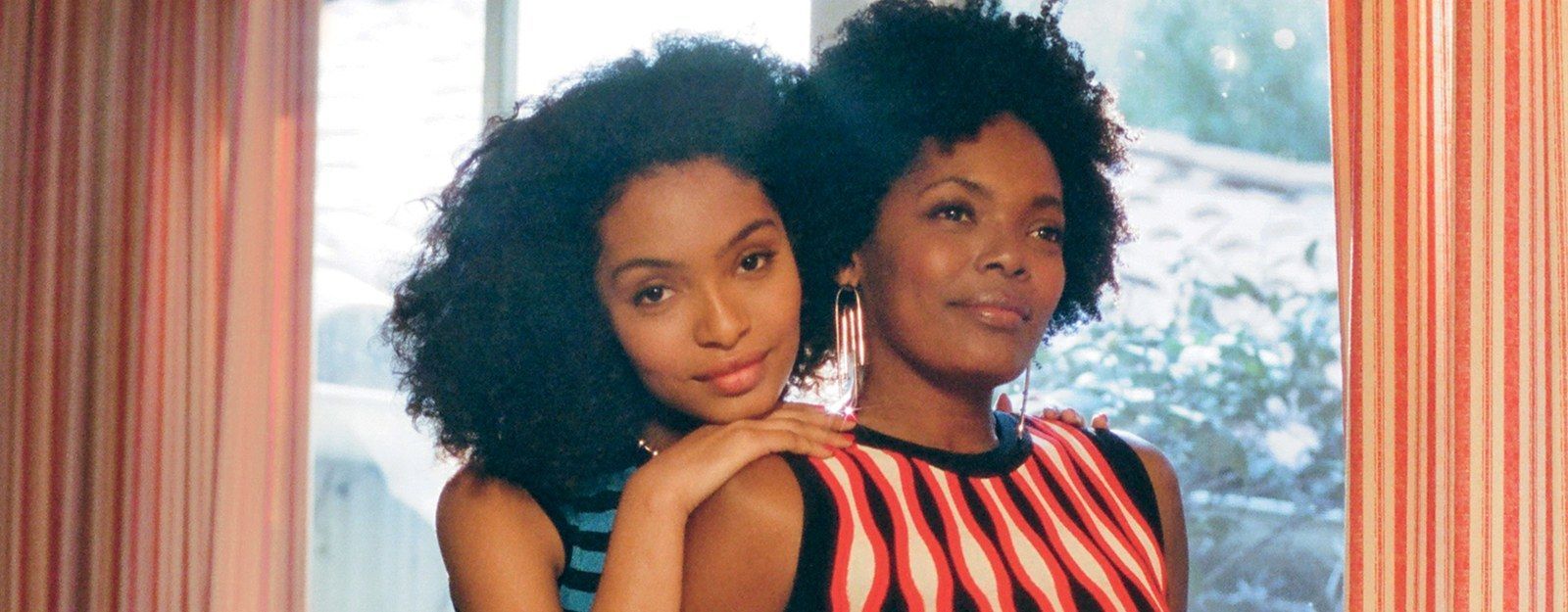
In a retro-wallpapered mansion in Beverly Hills, Yara Shahidi is teaching younger brothers Sayeed, 14, and Ehsan, 9, her basic style rules. “I do a robot test,” the Black-ish star says. “If you can’t do the robot in your dress, then it’s either too tight, too short, or too long.” Clearly she missed the memo that teen stars are supposed to be the worst-ish. At only 17, Yara’s at the forefront of a new guard of intellectually minded, politically inclined, and socially aware actresses. When she’s not advocating for girls’ education with Michelle Obama, you’ll find her lip-syncing to more than 600,000 followers on her sometimes playful, often thought-provoking Instagram feed, @yarashahidi. “I am the result of love,” she posted in February after President Trump’s first executive order on immigration. “If my Baba was stuck in an airport because of a Muslim ban 39 years ago, he would have never fallen in love with my mama.”
“Baba” is Yara’s father, Afshin Shahidi, who left Iran for the U.S. when he was eight years old. In 1992, while working in Minneapolis as a director of photography, he spotted grad student Keri Salter at a local lounge. “She ended up stalking me,” Afshin, now 47, jokes. His wife confirms: “Did he tell you I stalked him? Because I stalked him.” Following a move to Los Angeles in 2004, each family member found a role in showbiz: Keri, 47, an actress, has appeared in commercials with her kids; Afshin, who was Prince’s personal photographer, has a book of images coming out in the fall; Ehsan played O.J. Simpson’s son Justin in The People v. O.J. Simpson: American Crime Story; and Sayeed has guest-starred on Black-ish. Yes, the Shahidis often work together. “We’re so involved in one another’s lives,” says Keri, who documents their life @chocolatemommyluv. “It may look like helicopter parenting, but in black culture and Iranian culture, that interconnectedness is deeply important.”
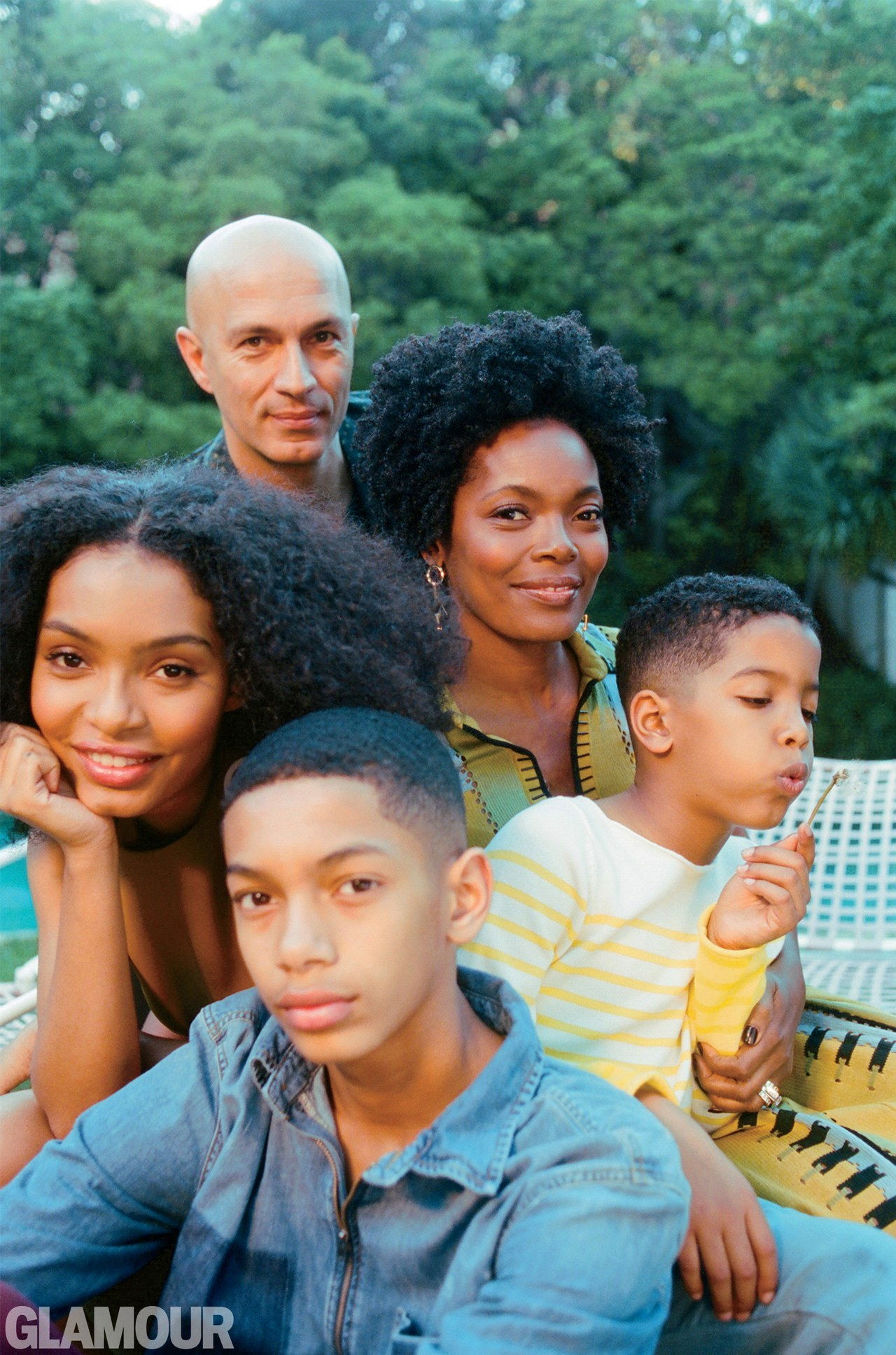
On Yara: Self-Portrait dress, $425. On Keri: Bottega Veneta dress. Eddie Borgo earrings, $235. On Ehsan: Bonpoint sweater, $180–$200. On Sayeed: Zara shirt, $30, zara.com.
It’s also a huge factor in the way the family communicates through clothing. Keri, a former athlete who grew up wearing “all-black sweats and earrings” and considers her look “more Stella McCartney than Louboutin,” often finds herself remixing her daughter’s wardrobe. “Yara has a similar aesthetic,” she says. “I think she got it from me, but she rocks it so good that I borrow from her. We’ve walked downstairs in the same pants before.”
No upbringing could have better prepared Yara to play Zoey Johnson, the clothes-loving, tech-savvy daughter of a black father (Anthony Anderson) and biracial mother (Tracee Ellis Ross). “I’m lucky to have landed Black-ish,” she says, “because I’m quite literally blackish.” Next up: a reported Zoey spin-off. Yara, who is debating new frontiers herself—equipped with a letter of recommendation from Michelle Obama, no less—is prepared. “Now that I’m getting ready to go to college, the questions are: What do you want to be? Who do you want to become?” she says. “My parents taught me that it’s not a monolithic answer. You can be anything.”
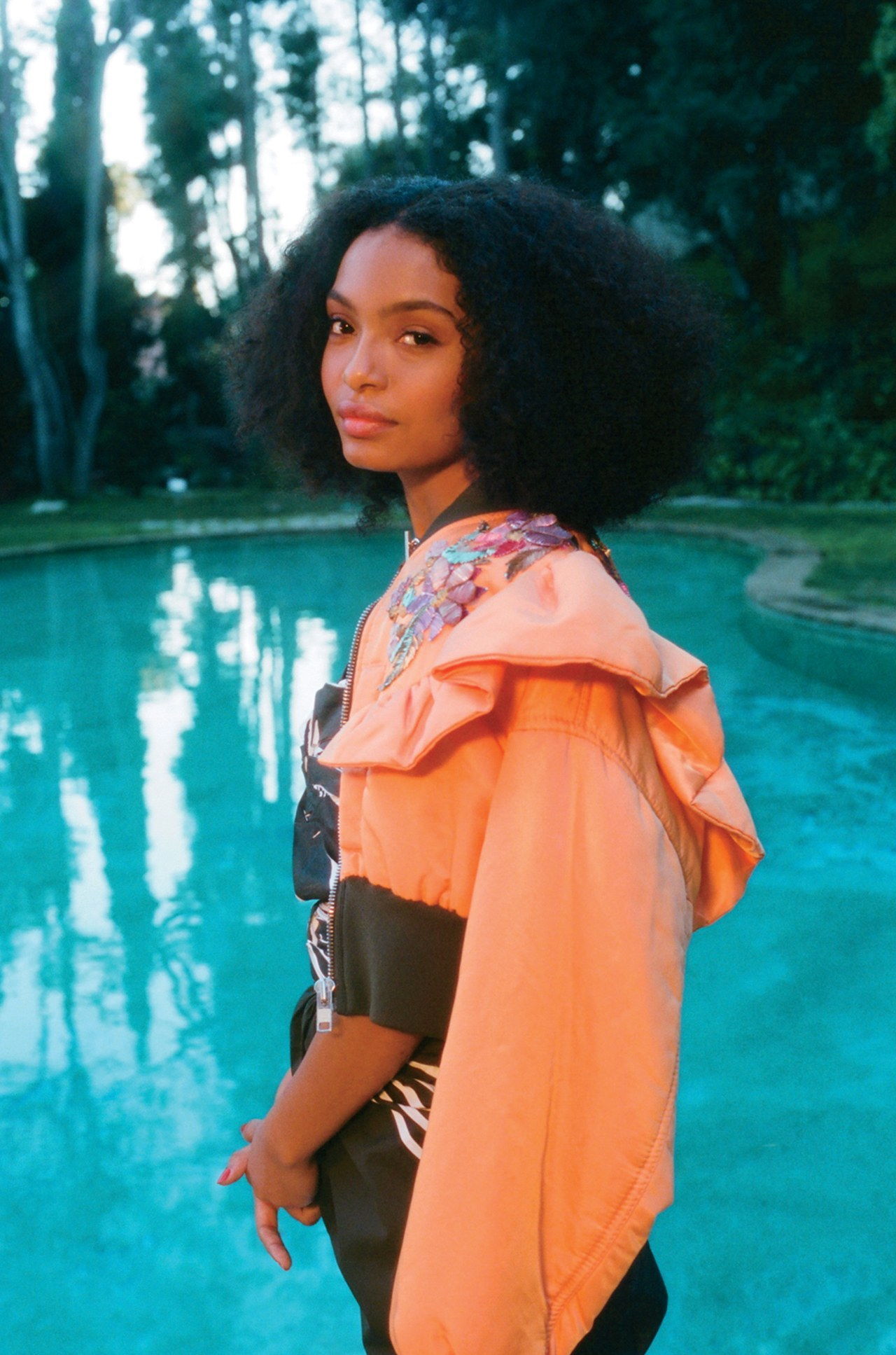
Marc Jacobs bomber. Salvatore Ferragamo dress. Jennifer Fisher necklace, $295.
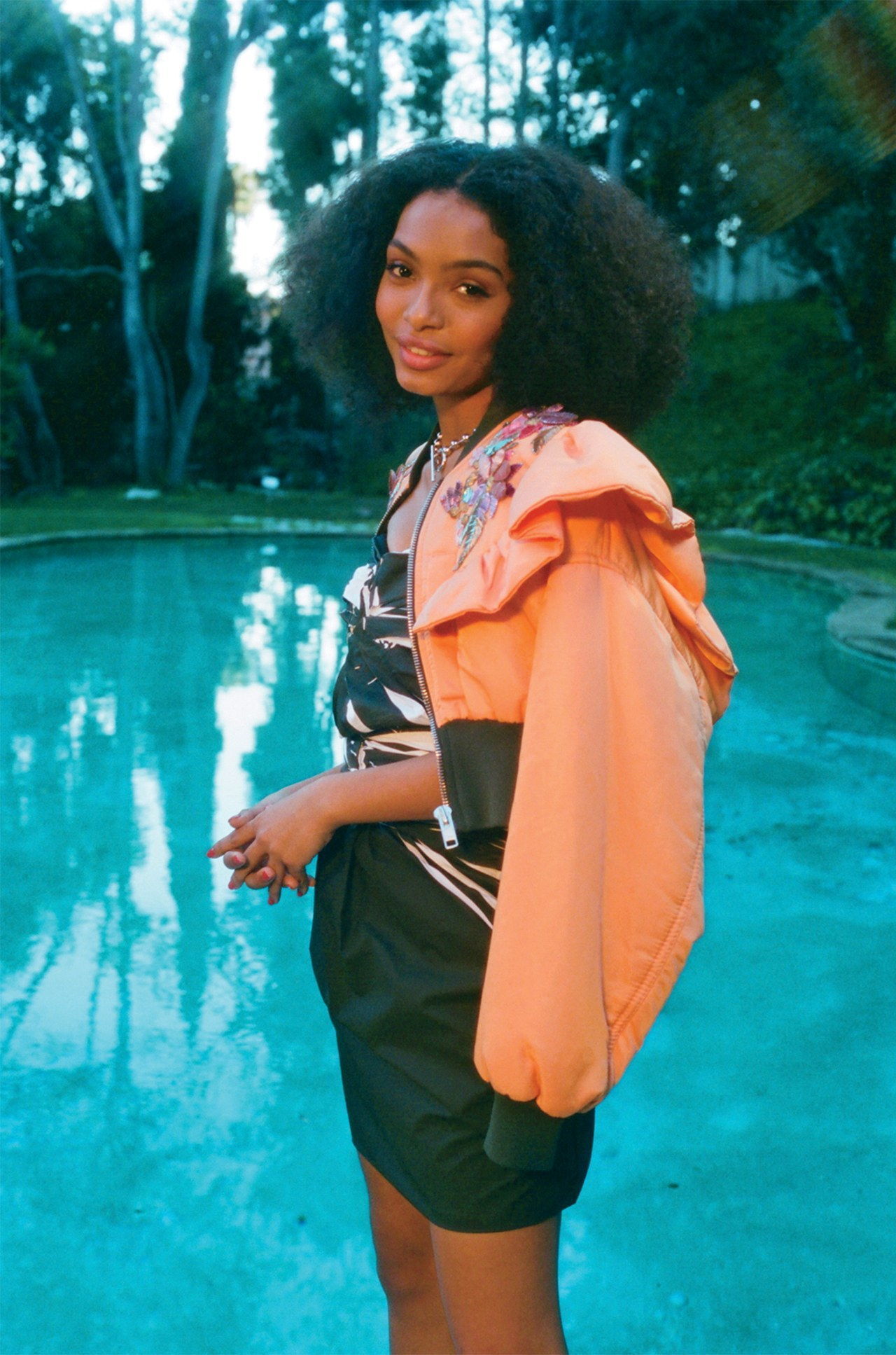
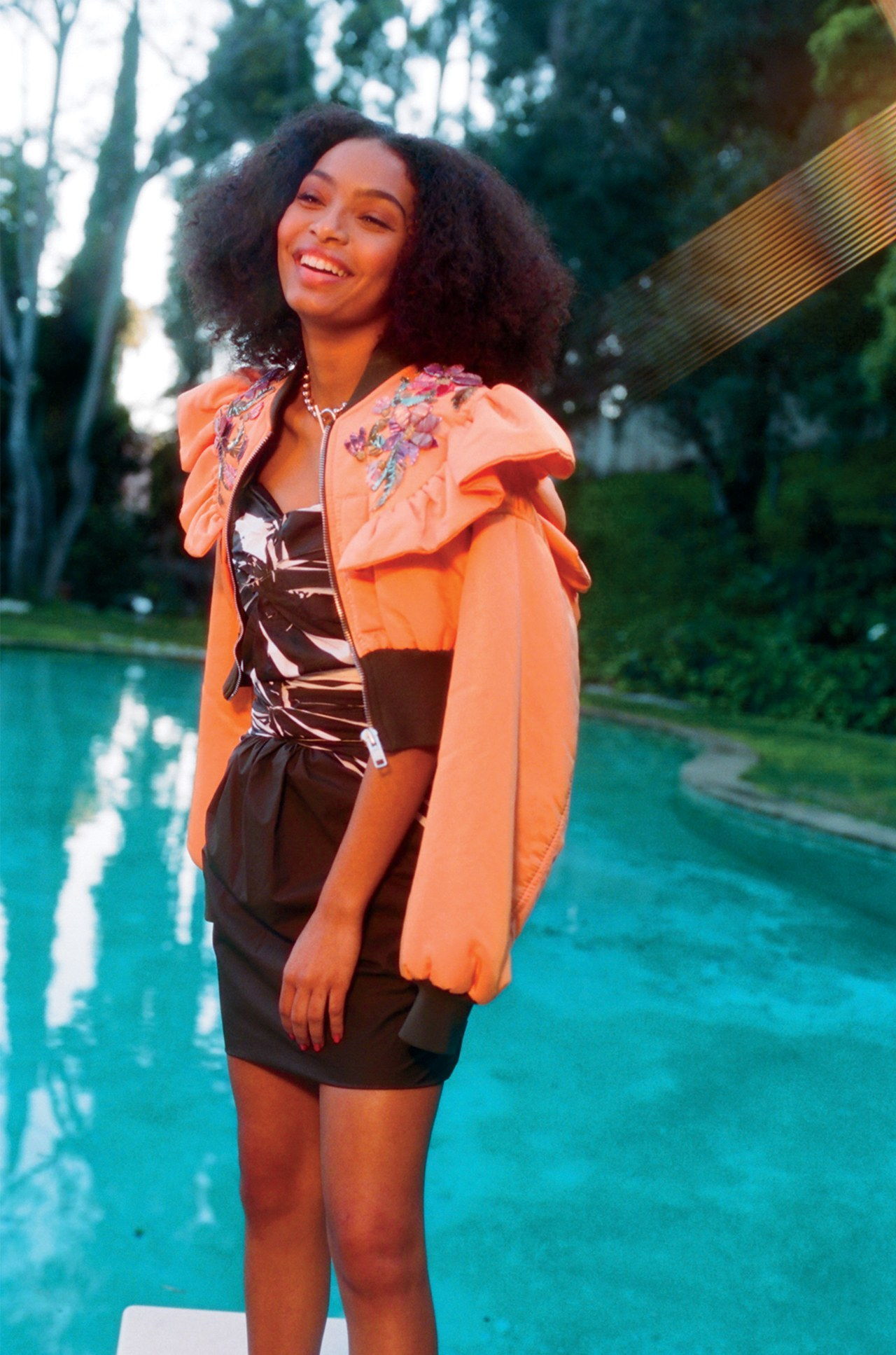
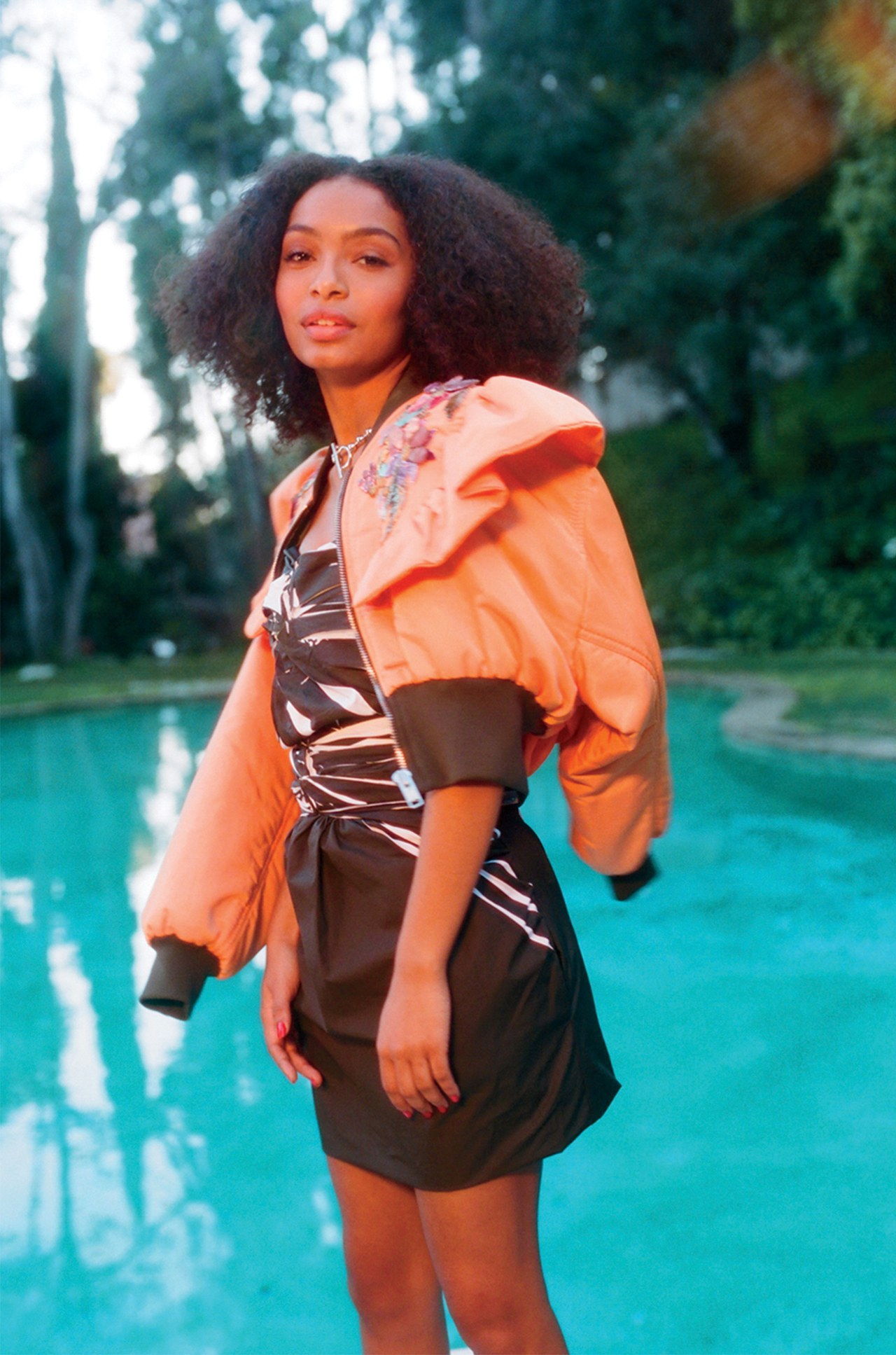
Here, the actress took a few minutes to talk style, family, and the empowerment that comes with being a young activist.
Glamour: What style instincts did you inherit from your mom?
Yara Shahidi: She and I dress very similarly. There are a lot of times when I’m in her closet and she’s in mine. When we’re working, we’re usually in jeans, a funky T-shirt, and a jacket. That said, I do like dressing up. I work with a stylist, but it’s very collaborative. [My stylist, Ade Samuels,] knows who I am. I’m 17, and I like staying 17. I can look older quickly, so it’s about having fun and not being restricted by my age but rather finding ways to revel in it. Why not wear bright colors? I have plenty of time to wear a deep-V-neck dress.
Glamour: Do you and your little brothers influence one another’s style?
YS: I’ve learned a lot from Sayeed [who is 14]. We started acting at the same time. We’ve played brother and sister in most of the projects I’ve done. Our style is very similar. He has a swagger that I love, but where I would wear jeans and a T-shirt, Sayeed adds a chain or a bomber jacket. A lot of [my nine-year-old brother] Ehsan’s clothes are things I wore, but he puts his own remix on it.
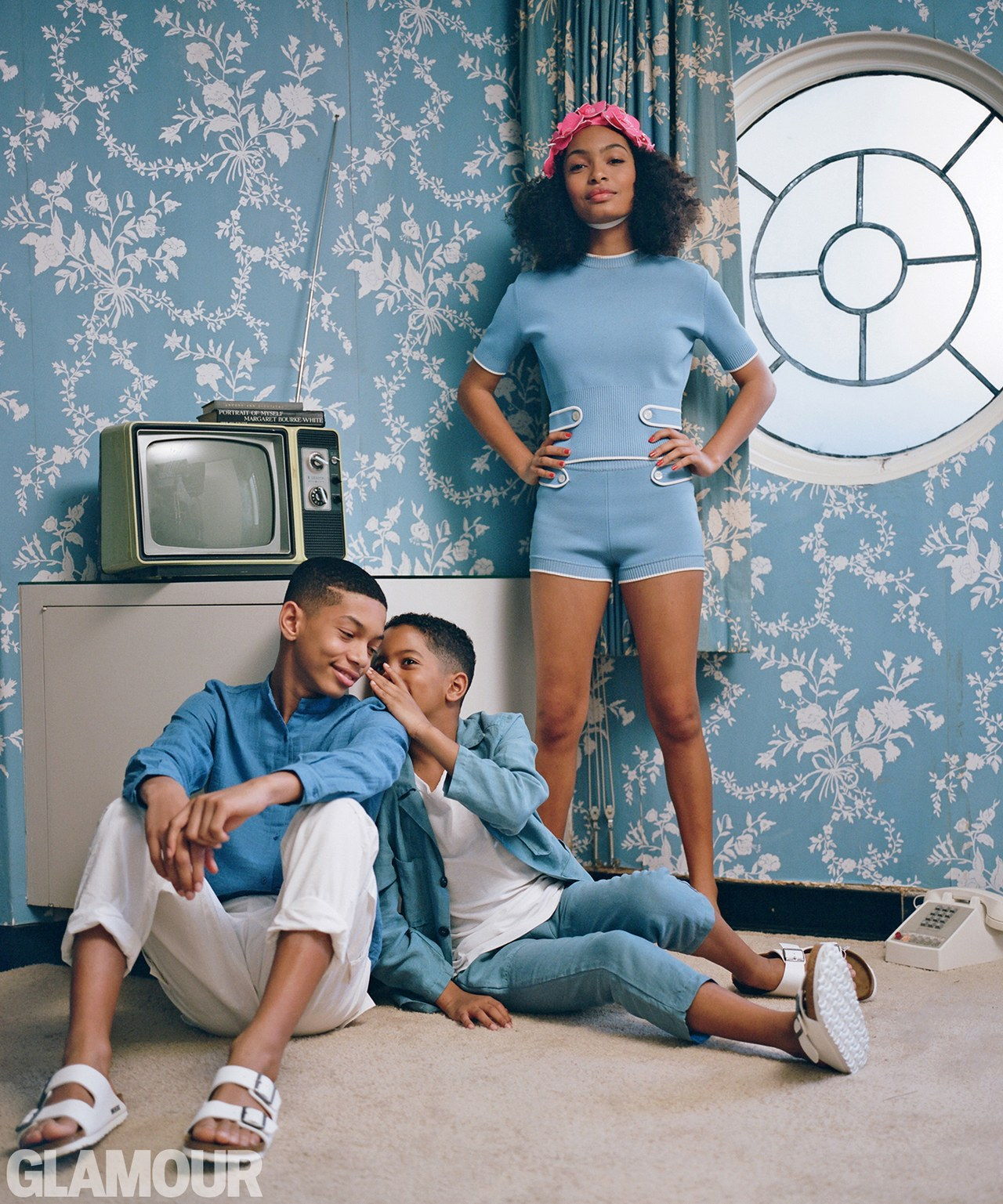
On Yara: Miu Miu top, shorts, and cap. On Sayeed: Bonpoint shirt, $130–$160. Polo Ralph Lauren pants, $60. Birkenstock sandals, $100. On Ehsan: Nico Nico jacket, $86, and pants, $68. Michael Stars T-shirt, $50. Birkenstock sandals, $100.
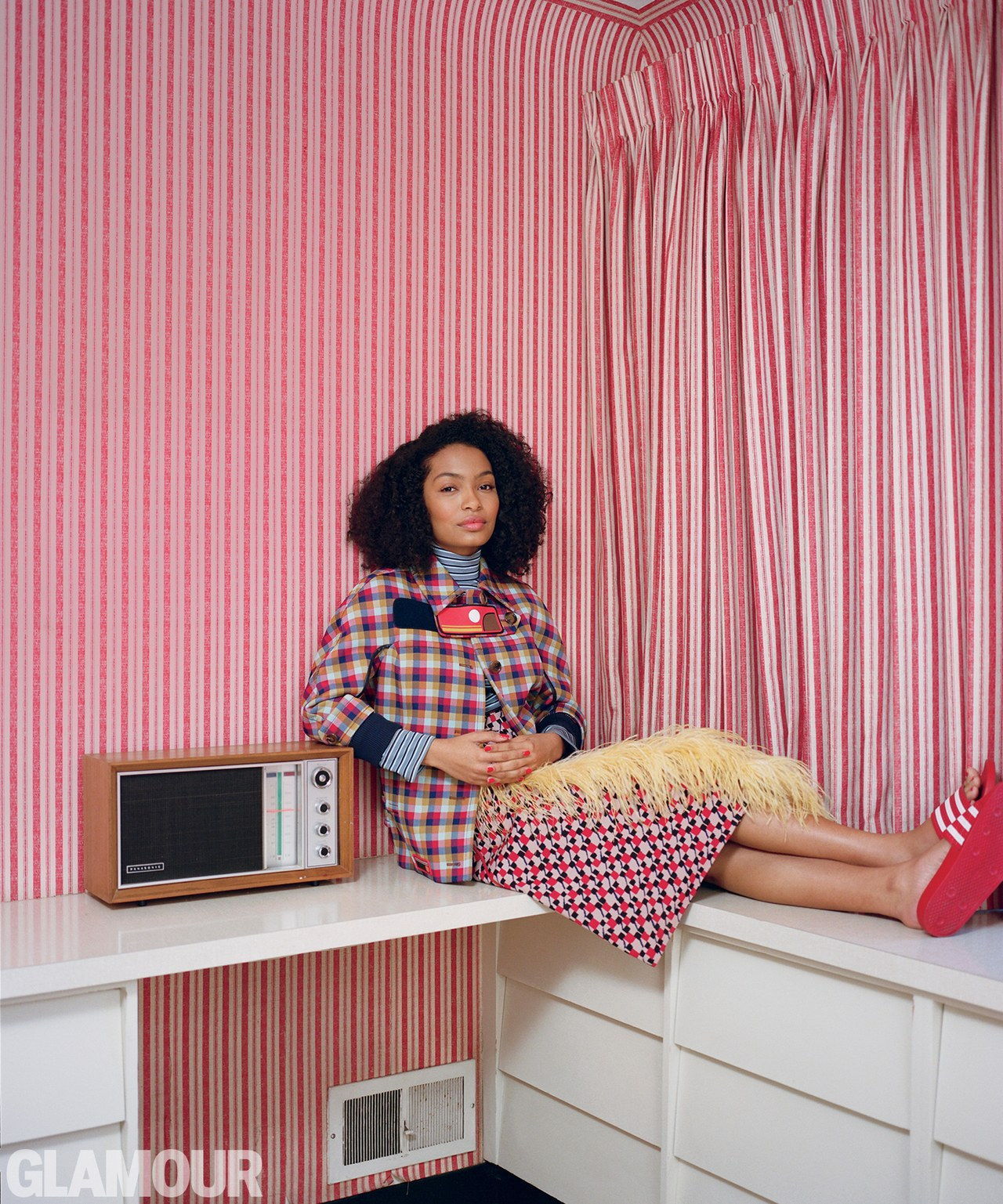
Prada jacket, turtleneck, $980, and skirt. Adidas Originals sandals, $45.
Glamour: How did your upbringing inform your role on Black-ish?
YS: My parents did a great job teaching us about both [African American and Iranian] cultures. As an entertainer, that adds another layer. No matter how cutting-edge Hollywood may seem, it is still delayed in how it views people: If [producers] do not perceive me as an Iranian girl, then I cannot play an Iranian girl. If you aren’t perceived as a full black girl, then it makes it more difficult [to play a black girl on TV]. Now that I’m going out for movies, I’m picking up on things I never picked up on before: It’s like, “Oh, you think I’m not black enough. You don’t think I’m Iranian enough for this role.”
Glamour: What have you taken from your experience working on Black-ish?
YS: I’ve learned how to receive love. When you know how to receive love on set, you’re able to bring your real life onto the set. There is no feeling that you have to be another person when you cross that Stage 4 line. There’s no feeling of having to impress one another. Because there’s that support system, you can be cranky. There are so many times in life when you have to suppress what you’re feeling. A lot of kids have to deal with that in a school environment: You’re not allowed to be happy, sad, depressed, over the moon. Being an actor—and working on a show like Black-ish—not only do I get to play an angsty teen, but I get the support that I need to be Yara.
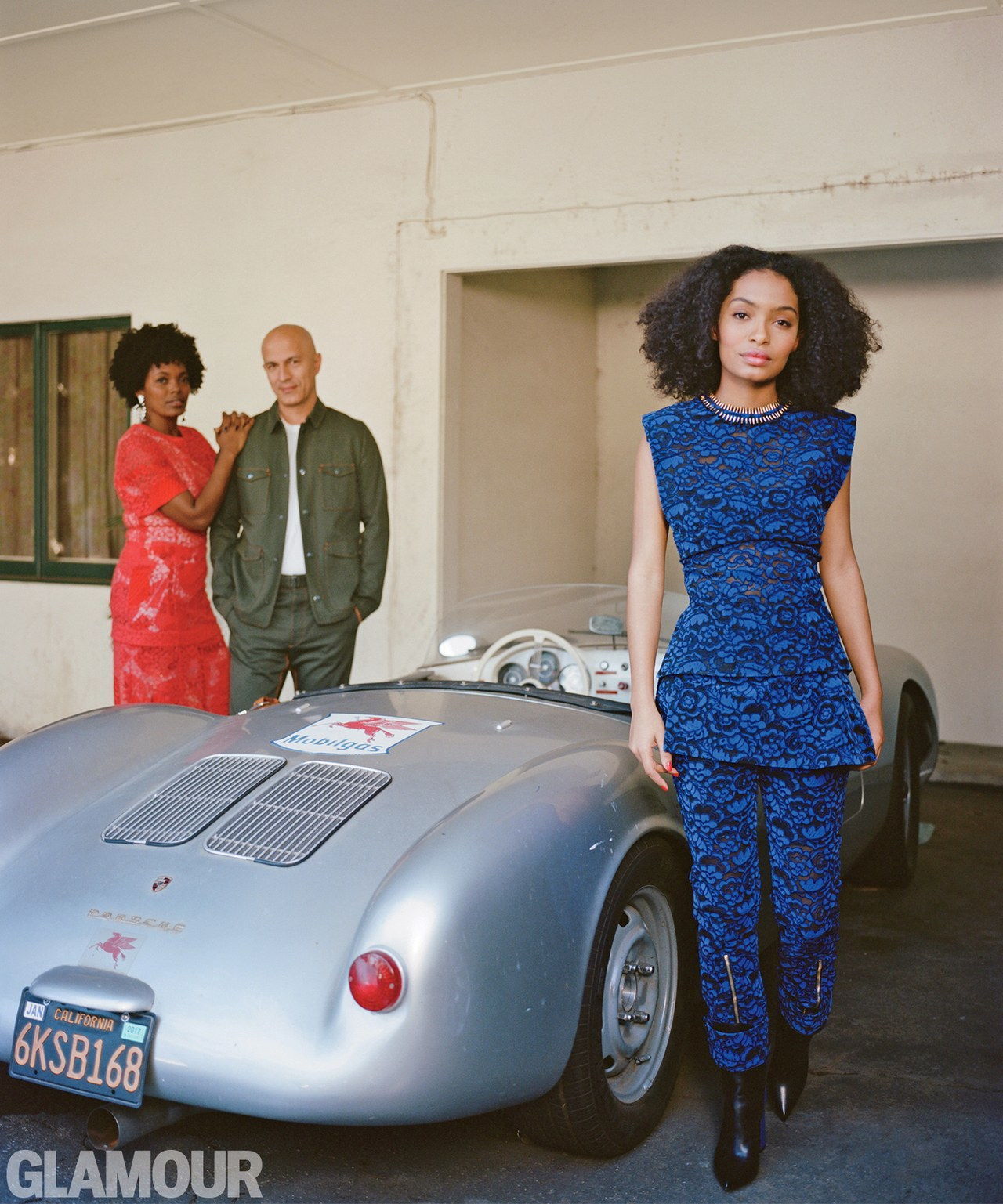
On Yara: Louis Vuitton top, pants, and boots. On Keri: Stella McCartney dress and leggings. Ann Taylor tank, $70. Tory Burch earrings, $175. On Afshin: Prada jacket, T-shirt, $370, pants, $690.
Glamour: How does it feel to be an activist in this current political climate?
YS: I feel both scared and empowered. So much of my work is as Yara, not as a character. If you’re attacking my work as a philanthropist or activist, you’re attacking Yara. But because of Black-ish and this national audience we have, I get to have a larger or louder voice. One thing I’ve tried to tell my peers is the amount of support that we do have. I feel the impact of my work and don’t feel as though I’m doing it for nothing. Black-ish has amplified the cause and the effect for me.
Photographs by Mayan Toledano
Fashion editor: Deborah Afshani
More From Our Icons Series:
Lena Dunham on the Feminine Power of Wearing Pants
Elizabeth Warren Has Millions of Young Fans, a New Book, and Swagger to Spare
Camila Cabello Came From Cuba With Only a Doll and a Dream
Three American Icons on Beauty, Flaws, and the Concept of Aging

